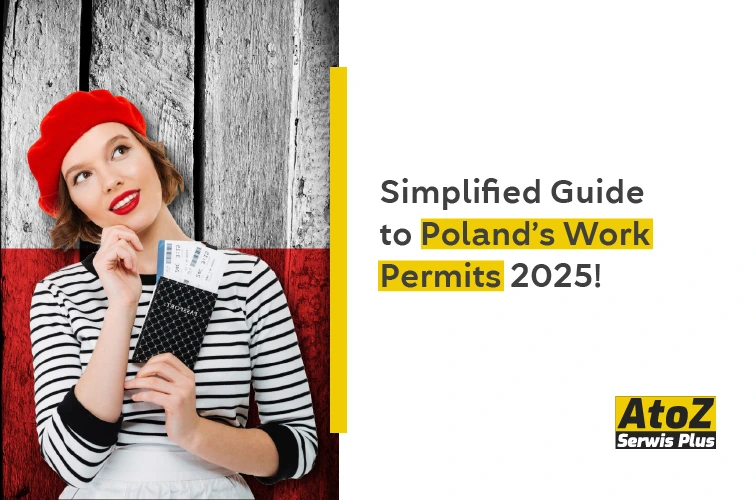

Simplified Guide to Poland's Work Permits 2025!
Poland is one of Europe’s top destinations for foreign workers, offering a welcoming job market and streamlined work permit processes. Whether you’re a skilled professional or looking for opportunities in Poland’s booming industries, understanding how the work permit system works is essential for a smooth transition.
What is a Poland Work Permit?
A Polish work permit is an official document that allows non-EU nationals to work legally in the country. The permit is tied to your employer, and the job role is valid only for the position and company specified in your application. EU and EEA citizens, on the other hand, are exempt from this requirement and only need to register their stay to begin working in Poland.
Types of Work Permits in Poland
Poland offers several types of work permits to accommodate different employment scenarios:
- Type A: For foreigners working under a Polish employer with a local employment contract.
- Type B: For high-level managerial positions requiring stays of more than six months.
- Type C: For employees sent to Poland by a foreign employer for over 30 days.
- Type D: For workers providing export services in Poland.
- Type E: For other roles that don’t fall under the above categories.
Each type of permit is designed to suit specific job requirements and employment structures, ensuring flexibility for foreign workers and their employers.
How to Apply for a Work Permit
Obtaining a work permit in Poland is straightforward but requires coordination between you and your employer. Here’s how it works:
-
Secure a Job Offer
It would be best to have a confirmed job offer from a Polish employer, as the work permit application is tied to the specific role. -
Employer Submits the Application
Your employer will apply for the permit at the local Voivodeship office. They must provide the necessary documents, including the job offer, employment contract, and proof that no suitable candidate could be found locally. -
Permit Processing
Once submitted, work permits typically take 4–8 weeks to process. -
Apply for a National Visa
After the permit is approved, you must apply for a Type D National Visa at a Polish consulate in your home country. This visa allows you to enter Poland and begin working legally. -
Start Working in Poland
Upon arrival, you can legally work under the conditions specified in your work permit.
Required Documents for a Work Permit
The following documents are typically required for a work permit application:
- A completed application form.
- A copy of your passport.
- Your employer’s statement of intent.
- The signed employment contract.
- Proof of qualifications and experience, if applicable.
- Evidence of health insurance coverage.
Industries Hiring Foreign Workers in 2025
Poland is actively seeking foreign talent across various industries to address labour shortages. The most in-demand sectors include:
- Information Technology (IT): Software developers, cybersecurity experts, and data analysts.
- Healthcare: Doctors, nurses, and allied health professionals.
- Construction: Engineers, electricians, and skilled labourers.
- Manufacturing: Machine operators, production managers, quality control specialists.
- Logistics and Transportation: Truck drivers, warehouse managers, and logistics coordinators.
- Agriculture: Seasonal workers for farming and food processing.
Special hiring programs are also in place for citizens of Ukraine, Belarus, Moldova, and other neighbouring countries, allowing for faster and more simplified work permit applications.
Validity and Renewal of Work Permits
Work permits in Poland are generally valid for up to three years, depending on the duration of your employment contract. If your contract extends beyond this period, you must renew your permit. You should start the renewal process in advance to avoid gaps in your employment authorisation.
Benefits of Working in Poland
Poland’s work permit system is designed to attract global talent and offers numerous benefits for foreign workers. These include:
- Expanding Job Market: Growing IT, healthcare, and manufacturing opportunities.
- Simplified Processes: Clear and straightforward application steps.
- Pathway to Residency: Long-term work permits can lead to permanent residency in Poland.
- Affordable Living Costs: Poland offers one of Europe's most affordable living standards.
Challenges and Tips
While Poland’s work permit system is accessible, expats may face language barriers and employer dependency challenges. Learning basic Polish can significantly improve your job prospects, especially for roles outside IT and multinational companies. Also, since permits are employer-specific, changing jobs requires a new application. To avoid delays, ensure your documents are complete, and your employer submits the application on time.
Final Thoughts
Poland’s simplified work permit process in 2025 opens the door to exciting opportunities across various industries. Whether you’re a skilled IT professional, a healthcare worker, or a blue-collar labourer, Poland offers a welcoming environment for foreign talent. With competitive salaries, growing industries, and a central European location, working in Poland can be the start of a rewarding career journey.
Need Assistance?
If you’re ready to start your journey to Poland, we’re here to help. From work permit applications to visa support and job placements, our team is committed to making your move seamless. Contact us today to take the first step toward your career in Poland!





